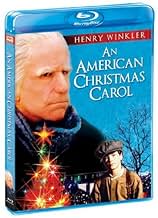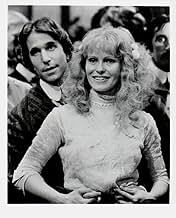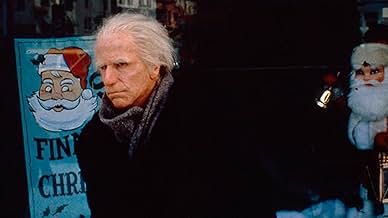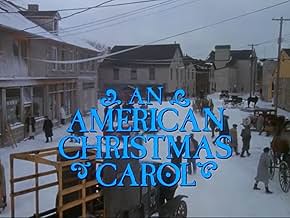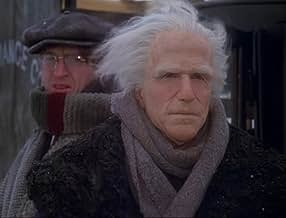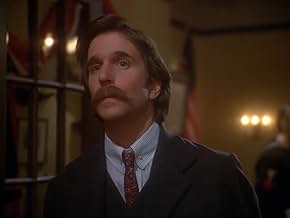IMDb-BEWERTUNG
6,8/10
1830
IHRE BEWERTUNG
Füge eine Handlung in deiner Sprache hinzuIn an American town, an old bitter miser is given a ghostly chance at redemption on Christmas Eve.In an American town, an old bitter miser is given a ghostly chance at redemption on Christmas Eve.In an American town, an old bitter miser is given a ghostly chance at redemption on Christmas Eve.
- Regie
- Drehbuch
- Hauptbesetzung
Ken Pogue
- Jack Latham
- (as Kenneth Pogue)
Christopher Crabb
- Jonathan Thatcher
- (as Chris Crabb)
Sylvia Marie Llewellyn
- Latham's Secretary
- (as Sylvia Llewellyn)
Empfohlene Bewertungen
Yet another version of the Charles Dickens classic, this TV movie moves the setting of the story to Depression-era America. The role of Scrooge (inexplicably renamed Benedict Slade, which sounds like a gunfighter from an old western) is played by 'The Fonz' himself, Henry Winkler. Despite many little changes, the basic story is the same: greedy old man is visited by spirits on Christmas Eve who convince him to change his ways before it's too late. It's a fine adaptation of the story, particularly considering it was made for TV. They do a good job with the sets and costumes of making it look the period (at least to my untrained eye), although the old-age makeup makes Winkler look like a cross between Albert Einstein and the Cryptkeeper. Winkler's performance is a little stagy. Not bad just a little out of step with the rest of the cast, who seem more aware what medium they're in. The cast, including fine character actor David Wayne, offer solid support. Despite some flaws, it's hard to dislike it unless maybe you're a Dickens purist who won't like the changes. It's not one of my favorite versions of the story but it kept my interest throughout so I can't complain.
In my attempt to watch every version of "A Christmas Carol" I came across this curiosity of 1979.
Here Henry Winkler plays the unmistakable Ebeneezer Scrooge character, this time set in Depression Era America rather than rat infested DIckens England.
Winkler plays Ben Slade, and in today's lingo he is a payday advanced loan jerk who has fleeced the community and lives well while others suffer. Then on Christmas Eve, he is met by ghosts who show him his past, present and future. The future ghosts amused me as it was...DECIDEDLY 1970's attire. Gold chain and all. The movie also has lighter moments. Comedy works best in this darkness.
The rest is the standard: sees the errors of his life and realizes leaving a legacy means more than money.
All good stuff.
The problem comes with some odd casting choices. Starting with Henry Winkler. Perhaps it was too close to "Happy Days" but the poor guy couldn't shake the attitude in his voice. Even though, he's seen here in heavy poorly constructed t.v. budgeted old-dude makeup he still sounded like...the Fonz. You half expect when the ghosts to show up for him to say "Oh heeey, the G of Christmas P" Unfortunately, Winkler went this route. But I also suspected producers may have actually wanted this. I mean, why get The Fonz if you can't hear the Fonz.
The guy who plays the Bob Cratchet character is sorely mis-casted. Though seen in most incarnations as a nebbish book worm, this dude just comes off as a nerd. I mean, worse, a Canadian nerd. He doesn't have the gravity of playing an adult nor presence of being one. He doesn't seem as if he could endure Slade's ways. Even as the transformations to good occur, the actor doesn't seem the bit surprised. He just goes along with the flow (which is mostly the director's blame).
The t.v. movie isn't bad. Although what appears to be pieced together by random standing sets and props, I can't imagine this movie cost much to make. The heart is DEFINITELY in the right space. And in the spirit of the holidays, it does do its job. It was a nice attempt at a novel idea on overused Christmas story. It isn't a complete waste of time. But beware of the corny within.
The t.v. movie isn't bad. Although what appears to be pieced together by random standing sets and props, I can't imagine this movie cost much to make. The heart is DEFINITELY in the right space. And in the spirit of the holidays, it does do its job. It was a nice attempt at a novel idea on overused Christmas story. It isn't a complete waste of time. But beware of the corny within.
Total 1970's TV movie greatness! This is how we used to do it! I've never seen this before but I was around back then and I can imagine watching it on our tiny home back then.
This movie is meant for big boxy television sets that were heavier than any 2024 electric vehicle on the road today.
Henry Winkler is an icon.
In 1979, there weren't many stars much bigger or brighter.
The man could do anything he wanted back then and millions of eyes would gather.
And so here he was back then.
Out of Fonzi's leather jacket and into heavy, almost Frankenstein-like makeup to play a stateside Scrooge-type early 20th Century character.
And believe it or not, he's as charismatic here as he is on Happy Days and even The Waterboy.
Such a legend. Such a great actor.
This is just an enjoyable, timeless, and fun family holiday film.
You know the story, but have you seen this version?
It's worth a look. A Seventies tv version of Dickens starring one of the coolest cats to ever do it.
This movie is meant for big boxy television sets that were heavier than any 2024 electric vehicle on the road today.
Henry Winkler is an icon.
In 1979, there weren't many stars much bigger or brighter.
The man could do anything he wanted back then and millions of eyes would gather.
And so here he was back then.
Out of Fonzi's leather jacket and into heavy, almost Frankenstein-like makeup to play a stateside Scrooge-type early 20th Century character.
And believe it or not, he's as charismatic here as he is on Happy Days and even The Waterboy.
Such a legend. Such a great actor.
This is just an enjoyable, timeless, and fun family holiday film.
You know the story, but have you seen this version?
It's worth a look. A Seventies tv version of Dickens starring one of the coolest cats to ever do it.
For a long time, I was fascinated by the make up of Henry Winkler. Better adaptations of A Christas Carol were more attractive and the story of venerable Benedict and his exploration of past, present and future, like the nice transformation was only a piece from a long chain.
But , seeing it again, I was fascinated by the nuances, tones and acting.
And more than seduced by the charming end.
Indeed, the story of a lonely old man, reduced to himself. But, in same measure, fine portrait of the selfishness as fruit of many bitter experiences and surogate of happiness. Not the make up rules but a beautiful acting, sustaining a precise, clear and touching message. And it is enough.
But , seeing it again, I was fascinated by the nuances, tones and acting.
And more than seduced by the charming end.
Indeed, the story of a lonely old man, reduced to himself. But, in same measure, fine portrait of the selfishness as fruit of many bitter experiences and surogate of happiness. Not the make up rules but a beautiful acting, sustaining a precise, clear and touching message. And it is enough.
Not enough people ever gave this one a chance, but it should be considered one of the better versions of "A Christmas Carol" out there.
Why did it fail? Well, who wanted to see "Fonzie" play Scrooge back in 1979? I must admit that I did not like this movie the first time I saw it either, but it grew on me, as any good movie does. Henry Winkler plays Depression era "Bennidict Slade" (what an inventive American equivalent for "Ebenezer Scrooge"!), a rich businessman that started out as a delinquent orphan that was adopted by a kind man he unwittingly ends up putting out of business in his pursuit of greed. The "Depression Era" skin put on this movie makes it all the more gray, bleak and believable.
One thing that hurt this movie was that it doesn't have as much of a "feel good" ending as the usual "Scrooge" versions, but I rank this one high because it has my absolute favorite ending of any version of the "Scrooge" genre.
Naturally, I can't spoil the ending, only to say that Slade has more fun surprising people with his new found attitude, knowing just how shocked everyone will be, than any Scrooge movie I've seen. It makes a fun difference. And his surprise for "Tiny Tim", very well done.
One annoying distraction, the "Ghost of Christmas Future" is portrayed by a black man wearing gold chains, dressed in 1979 fashions and listens to disco music. Their "Ghost of the Future" jumped a little too far ahead, and is comical by todays standards.
But this is a great version, and if you are bored to death with endless variations of "A Christmas Carol" where you know the story blindfolded, then I highly recommend you give this one a chance. You'll like it as long as you don't try and compare it to A.C.C., looking for places where they changed the story.
Why did it fail? Well, who wanted to see "Fonzie" play Scrooge back in 1979? I must admit that I did not like this movie the first time I saw it either, but it grew on me, as any good movie does. Henry Winkler plays Depression era "Bennidict Slade" (what an inventive American equivalent for "Ebenezer Scrooge"!), a rich businessman that started out as a delinquent orphan that was adopted by a kind man he unwittingly ends up putting out of business in his pursuit of greed. The "Depression Era" skin put on this movie makes it all the more gray, bleak and believable.
One thing that hurt this movie was that it doesn't have as much of a "feel good" ending as the usual "Scrooge" versions, but I rank this one high because it has my absolute favorite ending of any version of the "Scrooge" genre.
Naturally, I can't spoil the ending, only to say that Slade has more fun surprising people with his new found attitude, knowing just how shocked everyone will be, than any Scrooge movie I've seen. It makes a fun difference. And his surprise for "Tiny Tim", very well done.
One annoying distraction, the "Ghost of Christmas Future" is portrayed by a black man wearing gold chains, dressed in 1979 fashions and listens to disco music. Their "Ghost of the Future" jumped a little too far ahead, and is comical by todays standards.
But this is a great version, and if you are bored to death with endless variations of "A Christmas Carol" where you know the story blindfolded, then I highly recommend you give this one a chance. You'll like it as long as you don't try and compare it to A.C.C., looking for places where they changed the story.
WUSSTEST DU SCHON:
- WissenswertesThe clinic to which Benedict sends Jonathan to treat his polio was run by Sister Elisabeth Kenny, founded in 1932 in Townsville Queenland, over 2000km away from Sydney, which is where the last ticket went to that Slade gave Jonathan as a Christmas gift.
- PatzerNear the end of the film, Slade tells Thatcher's son he's sending him to Australia to a clinic run by "Sister Elizabeth Kenny" (a nurse) to cure his polio caused paralysis. Such a nurse did exist and had developed an effective therapy to cure paralysis. However an American stricken with polio couldn't travel there to visit her. Her methods needed to be employed immediately upon contracting the disease and such a journey would take too much time. American patients were treated by their local doctor or nurse who'd read up extensively on her methods.
- VerbindungenFeatured in Everything is Terrible! Holiday Special (2012)
Top-Auswahl
Melde dich zum Bewerten an und greife auf die Watchlist für personalisierte Empfehlungen zu.
Details
Box Office
- Budget
- 2.000.000 $ (geschätzt)
Zu dieser Seite beitragen
Bearbeitung vorschlagen oder fehlenden Inhalt hinzufügen


